<Back to Index>
- President of the Generalitat de Catalunya Lluís Companys i Jover, 1882
- 1st Lehendakari of Euzkadi José Antonio Aguirre y Lecube, 1904
PAGE SPONSOR
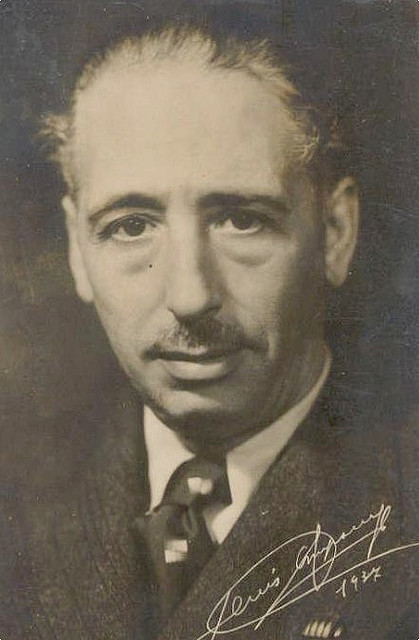
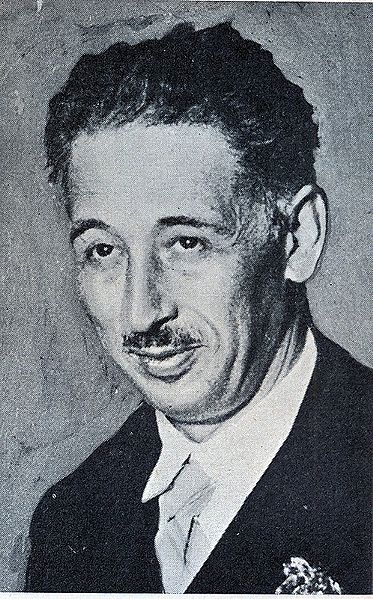
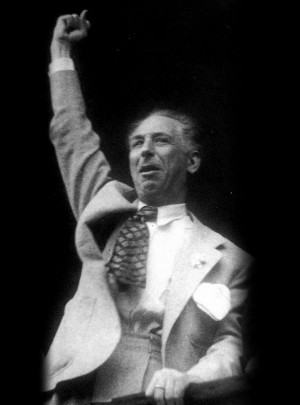
Lluís Companys i Jover (June 21, 1882 – October 15, 1940) was the 123rd President of Catalonia, Spain, from 1934 and during the Spanish Civil War.
He was a lawyer and leader of the Republican Left of Catalonia (ERC) political party. Exiled after the war, he was captured and handed over by the Nazi secret police, the Gestapo, to the Spanish dictatorship of Francisco Franco,
who had him executed by firing squad in 1940. Companys is the only
incumbent president of a region in Europe to have been executed, and seventy one years later the Spanish state has not yet annulled the council of war which sentenced him.
Companys was the son of farmers Josep Companys and Maria Lluïsa de Jover. After getting his law degree from the Universitat de Barcelona, Companys participated in the political life of Catalonia from a young age. In 1906, as a result of the military burning the writings of Catalan newspapers Cu-Cut! and La Veu de Catalunya, and after the passing of the Ley de Jurisdicciones ("Law of Jurisdictions"), which made speech against Spain and its symbols a criminal offense, he participated in the creation of Solidaridad Catalana.
Later, he became affiliated to the ephemeral Unió Federal Nacionalista Republicana, of which he was president of the youth section. He was investigated for his intense youth activities and was jailed fifteen times, being classified after the Tragic Week of Barcelona as a "dangerous individual" in police records.
With Francesc Layret, Companys represented the left wing labor faction of the Partit Republicà Català (Catalan Republican Party), for which he was elected councilor of Barcelona in 1916. In November 1920, he was detained together with Salvador Seguí (known as El Noi del Sucre), Martí Barrera, Josep Viadiu, and other trade unionists and was deported to the Castell de la Mola in Mahón, on Menorca. Shortly afterward, Layret was assassinated while preparing his defense.
Despite his deportation, in the 1920 legislative elections, Companys was elected deputy of Sabadell, taking the place of Layret, who was to have taken that seat prior to his assassination. This gave him parliamentary immunity, which secured his release from prison.
Companys was one of the founders of Unió de Rabassaires in 1922, for which he worked as a lawyer and director of the magazine La Terra during the years of the regime of Primo de Rivera.
Detained again, he was unable to attend the Conferencia de Izquierdas (Conference of Leftists) held between March 12 and March 19, 1931, from which was born the ERC political party; however, he was elected as an executive member of that party, representing the Partit Republicà Català. Thanks to the bonds between the Spanish labor movement and the Spanish union movement, the election of Companys to this position gave the ERC great prestige amongst left wing public opinion, whereas before, it had been considered a party of the small progressive bourgeoisie.
On October 6, 1934, Companys led a Catalan Nationalist uprising against the center and right wing republican government, and proclaimed the Catalan State (Estat Català), an action for which he was arrested and sentenced to thirty years in prison. However, after the 1936 election and the victory of the left wing coalition Frente Popular, he was set free by the new government.
When the Spanish Civil War began shortly after, in July 1936, Companys sided with the Second Spanish Republic against the Nacionales rebels and was instrumental in organizing a collaboration between the Central Committee of Anti - Fascist Militias, which was sponsored by his Catalan government, and the Workers' Party of Marxist Unification (POUM), a revolutionary anti - Stalinist communist party, and Confederación Nacional del Trabajo (CNT), an anarchist syndicalist trade union.
During the war, Companys attempted to maintain the unity of his political coalition, but after the Soviet Union consul, Vladimir Antonov - Ovseenko, threatened that his country would cut off aid to Catalonia, he sacked Andrés Nin from his post as minister of Justice in December 1936.
Exiled to France in 1939 after the Civil War, he was arrested and extradited by Nazi German authorities to the Spanish government in September 1940. Companys was executed, after a military trial lacking legal guarantees, at Montjuïc Castle on October 14, 1940. He is buried at the Montjuïc Cemetery, near the castle.
The main stadium used for the 1992 Summer Olympics, located on Montjuïc, is officially named in his memory. In 1998 a monument to Companys was installed near Arc de Triomf, on Passeig de Lluís Companys in Barcelona. A friend of Companys, Conxita Julià, is portrayed next to Companys' image in the monument.
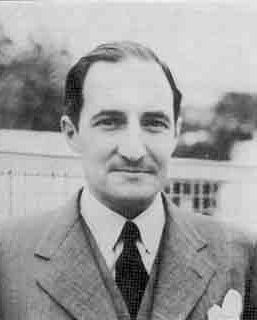
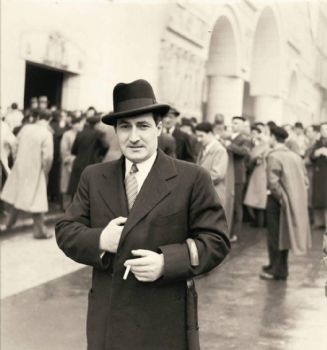
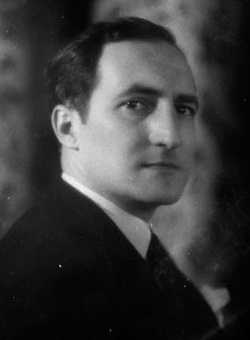
José Antonio Aguirre y Lecube (6 March 1904 – 22 March 1960) was a political figure of the Basque Nationalism, the first president of the Basque Autonomous Community, from 1936 to 1960.
He assumed the position of first lehendakari or president of Euzkadi (the Basque lands of Spain not including Navarre) during the Spanish Civil War. However, by the moment the Government was put together and made effective, most of the Basque region was occupied by the military rebels' troops, except for Biscay. Given the dire circumstances, he set about creating a Basque Army to fight on the side of the Republic.
After
losing the war, he had to organize the flight of thousands of refugees
in the Basque Country. He helped the Allies in the Second World War
looking forward to be helped to fight Francisco Franco in Spain. He escaped from Spain to Belgium, later to Nazi Germany and spent there a year with a false passport. He went to Argentina to
begin a journey in the American continent to re-organize the Basque
government in exile. He finally settled in Paris and spent his last
years there, working for the Basque refugees.
Jose Antonio Agirre, the man who was going to be the first president of the Basque government was born in Bilbao, in Biscay. He studied in the first ikastola of the Basque Country, a school where he was taught completely in Basque language. He later studied Law in the University of Deusto.
In 1920 his father died and all the family moved to Algorta, a town close to Bilbao. He was 16 years old when that happened and the eldest of 10 brother and sisters. He took the role of father for his younger family members.
After finishing his law studies, he began working in the family business “Chocolates Aguirre”. He later took the responsibility of the business. He made big reforms there introducing reforms that improved workers conditions in the factory (free health care, paid holidays, donating a part of the business earnings to the poor people, pushing for social housing, etc.) He created a new way of managing the business, being coherent with the ideas he believed in. Until 1937, “Chocolates Bilbaínos S.A.” was the second biggest enterprise of the sector in Spain.
Aguirre was a football player and he played for Athletic Bilbao. During the Spanish Civil War, he was one of the main promoters of the Basque Country national football team. This regional team played in Europe and America to raise funds for the Basque refugee children whose parents had to escape to exile.
In 1926 he finished his Law studies and enlisted for military service. After this period he began to work as an attorney at Esteban Bilbao's office, but soon created his own law firm to help people he was really interested in. He began working in political and labor issues. Spain was ruled by the dictator Miguel Primo de Rivera.
He already had very clear political views and as a Basque nationalist, he joined the young political party Basque Nationalist Party, PNV. The party was then divided in two political streams, but he never liked this division. He thought that love for the Basque Country was above political differences. He worked to join the two parts and he succeeded in 1930. Tough in his beliefs, he got more and more involved in politics, and he published articles in the newspapers Euzko Gaztedia and Euzkadi. An example of his integrating and new ideals, in 1932 he proposed that the party should accept people who were not born in the Basque Country.
After the end of the dictatorship of Primo de Rivera in 1930, a new political era began in Spain. At the same time, a new
and important period began in Aguirre's political life.
Aguirre was loyal to the Second Spanish Republic, knowing that the future of Euzkadi was dependent on a Republican victory. In Euzkadi, he formed a government and an army comprising nationalists, republicans, Socialists, Communists and others.
Poorly armed and barely trained, the Basque Army, the Euzko Gudarostea, managed to mobilize 100,000 soldiers. One of the most pressing deficiencies, that unbalanced the odds, was the absence of heavy artillery and aviation. Famous are the desperate calls of Aguirre to his allies Prieto and Azaña to send equipment to Euzkadi. Historians agree that this action was nonviable due to the difficulty in breaking the siege that Biscay was put under.
In June 1937, the nationalists broke through the Iron Belt of Bilbao and entered the Basque capital thanks to the defection of the engineer Goicoechea, who had designed the fortifications. Aguirre transferred his Government to Trucíos before maintaining course to Santander later to march to Catalonia, where he arranged to continue fighting with his men for the Republic.
In the meantime, the nationalist leader Juan de Ajuriaguerra agreed to a surrender in Santoña (province of Cantabria) to the Italians. Franco did not respect this Santoña Agreement, all behind the back of Aguirre, who was in favor of continuing the conflict.
But
events superseded the efforts of the first lehendakari in history, who
fled to France after the war, being pursued for years by pro-Franco
agents, leading to an incredible exile that took him to Paris, Berlin,
and New York. In June 1940, the Breton Yann Fouéré gave him documents that allowed him to escape France, which was invaded by the Nazis, allies of Franco.
Aguirre went first to France, where he organized the camps and services with him heading them personally. He was in Belgium when Hitler occupied that country and so he started a long travel to Berlin under a false identity.
Under the protection of a Panamanian ambassador, he reached Sweden and, dodging SS German intelligence, he arrived in Brazil on the ship Vasaholm to the port of Rio de Janeiro on 27 August 1941, the Brazilian customs authorities registered that Panamanian Dr. José Álvarez Lastra and Venezuelan María de Arrigorriaga, the last accompanied by their children, José and Gloria, entered the country.
They did not suspect that they were José Antonio Aguirre, his wife María Zabala and their sons Aintzane and Joseba, escaping the long arms of the Nazis. But in spite of the intense efforts made by Manuel de Ynchausti in the United States, the difficulties remonstrated by the English consul Ralph Stevenson around the impossibility of entering with a name and leaving with another seemed far from being solved. While after a month his true personality was in danger of being discovered.
He wrote then to Ramón María de Aldasoro, former Counselor of Intendency and Commerce of the Basque government, who led the Euzkadi Delegation in Buenos Aires. This representation, begun by Isaac López Mendizabal, Santiago Cunchillos and Pablo Artzanko, had arrived to America on November 1938. But the efforts made by Aldasoro did not succeed because Argentine authorities sympathized with the European "New Order".
Seeing it, Aguirre went to Uruguay and there requested by a reduced group of Basque patriots what Argentina denied. The Uruguayan president general Alfredo Baldomir not only was willing to do it but to receive him with the honors corresponding to his high dignity. Six men mobilized the political personalities there not only to get safety but to awaken the consciences of the diaspora, dormant because of Francoist propaganda.
Culminated
the arrangements, the public announcement of the arrival of the
president would be made on 8 October, when the Montevidean newspapers
informed widely about his arrival and his biographical whereabouts. A
little delegation accompanied by congressional representatives Julio Iturbide and Juan Domingo Uriarte went to the Brazilian state of Río Grande do Sul accompanied by its Uruguayan consul, to accompany him in his last stage of his travel.
His personality was reinstated and given visa to New York, where he was established under the protection of American - Basques as teacher of Columbia University. When the United States decided to back Franco in 1952 he went to France anew where the Basque Government in exile was established. Also there he encountered that the pro-Nazi French government of Vichy confiscated the Basque Government building and De Gaulle maintained it under the possession of the Franco government. The building houses today the premises of the Instituto Cervantes.
The president of the government in exile was always a PNV member and even the Spanish sole representative in the United Nations was the Basque appointee, Jesús de Galíndez, until his murder in an obscure episode in the time of the Spanish entry in the United Nations. He also decided to put the big Basque exiles network at the service of the Allied side and collaborated with the US Secretary of State and the CIA during the Cold War to fight Communism in Latin America.
Aguirre died in Paris on 22 March 1960 of a heart attack, aged 56. His body was shipped from Paris to Saint - Jean - de - Luz in the French Basque Country where it spent a night in the Monzón house. He was buried on 28 March after a funeral mass at the Saint Jean parish church.